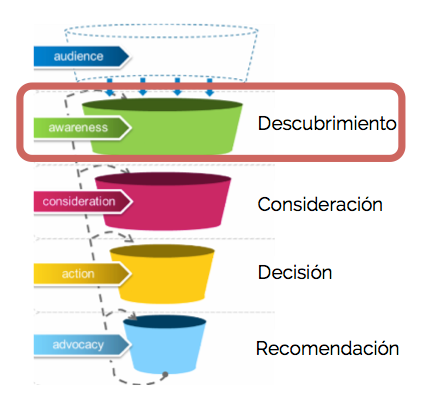Written by Fernando Maciá
Index
What are anticipatory searches
The forward-looking searches are those used by users who are in the first stage of the conversion funnel – discovery – or those users whose level of knowledge of the market or the search engine is very primary and are therefore also at an early stage of investigation or discovery.
Anticipatory searches can be conditioned by multiple variables such as the stage of the conversion funnel in which the user is or the degree of knowledge of the subject matter.
Anticipatory searches are not usually targeted keywords for our business and therefore are not usually in our monitoring list. However, they are very useful if we use them in our content (blog, FAQs…) since, as you will see throughout this post, they are sometimes very used searches that can bring us traffic. Users arriving from these searches do not tend to convert to the extent that users with branded or more specific searches convert. However, this way we can get on their radar, and then guarantee them a good experience on our site (complete information, ease of use…) can lead to recurring visits, which will increase the likelihood of conversion.

- Searches by a neophyte user (anticipatory searches)
A user has a problem with acne, oily skin, blackheads or anything similar. They want to find the solution to their problem with some beauty treatments but they are newcomer to the subject. Therefore, their searches will be of the type “beauty treatments for face”, “remove blackheads from face”, “acne treatments”, “acne”, “acne problems”, “remove blackheads from face” or “facial cosmetics”.
- Searches of an average user
On the other hand, if they are already versed in this subject, they understand the cosmetic terminology and know, approximately, what they need. Therefore, they are likely to search for terms such as “facial peeling”, “face exfoliating treatment” or any other more specific search formula that denotes that they know better what they want and what they need.
- Expert user searches
If we go one step further in the user’s expertise and talk about a regular consumer of this type of services or products, surely the search will revolve around a specific brand and product, for example “Singuladerm Xpert Sublime Serum 30ml” or “Triple Active Hydrafresh by L’oreal”.
Other examples of anticipatory searches
Above we have seen the example of a concrete case. We will attach some more examples:
- The user is planning a trip
- Romantic destinations
- Rural getaways
- Vacation plans for children
- The user is planning to purchase a television
- Best TVs
- What is a Smart TV
- Differences between LED and LCD TVs
- TV brands
- The user wants to start doing sports
- Sports to define the lower back
- Doing sports with little time available
- Sports at home
- The user plans to buy or rent an apartment
- Prices of apartments in Malasaña
- Rental policy for tenants with pets
- Areas with cheapest rents in Madrid
- Aspects to take into account before renting an apartment
Anticipatory search and web architecture
Anticipatory searches rarely have a place in the non-blog part of the page architecture. They are usually used to optimize blog categories, specific posts or frequently asked questions. Of course, everything will depend on the type of site, its purpose and its information distribution.
Anticipatory searches are often used to optimize blog categories, specific posts or frequently asked questions.
For example, we are an agency that offers different social media visibility services. An anticipatory search could be “social network for restaurants”, motivated by the user’s need to investigate how to increase the visibility of their restaurant business on social networks. Another anticipatory search might be “what is Facebook” or “how to use Facebook for my business.” These pages fit better in blog posts or FAQs than in service pages, which would be oriented to the specific products we offer, and which would be searched for by a customer who wants to hire us. We are talking about searches such as “social media company”, “social media management”, “Facebook Ads campaign”, etc.
References
Article Defining a keyword list: aspects to take into account
